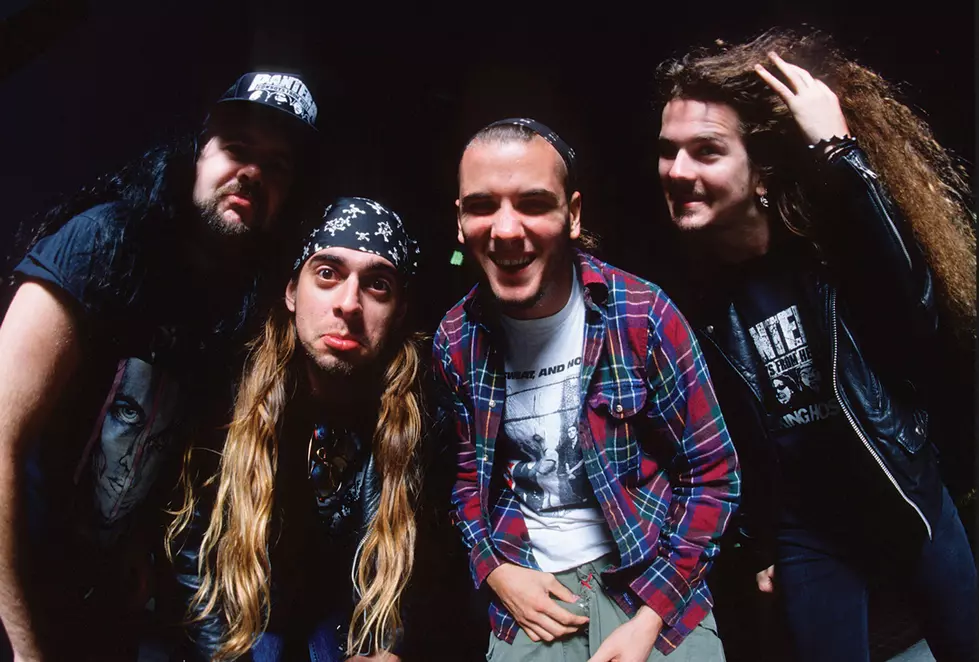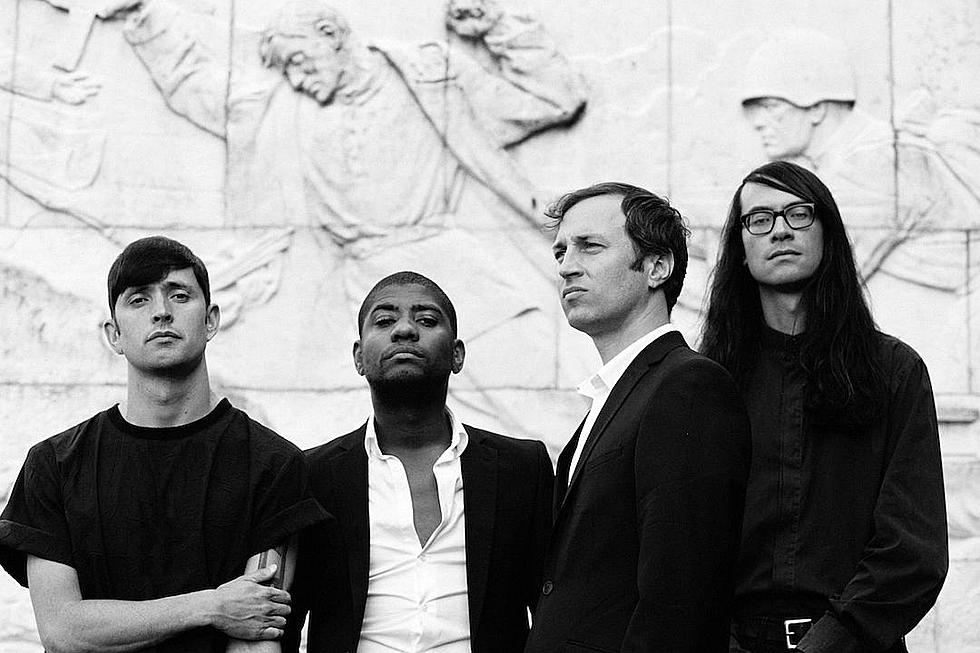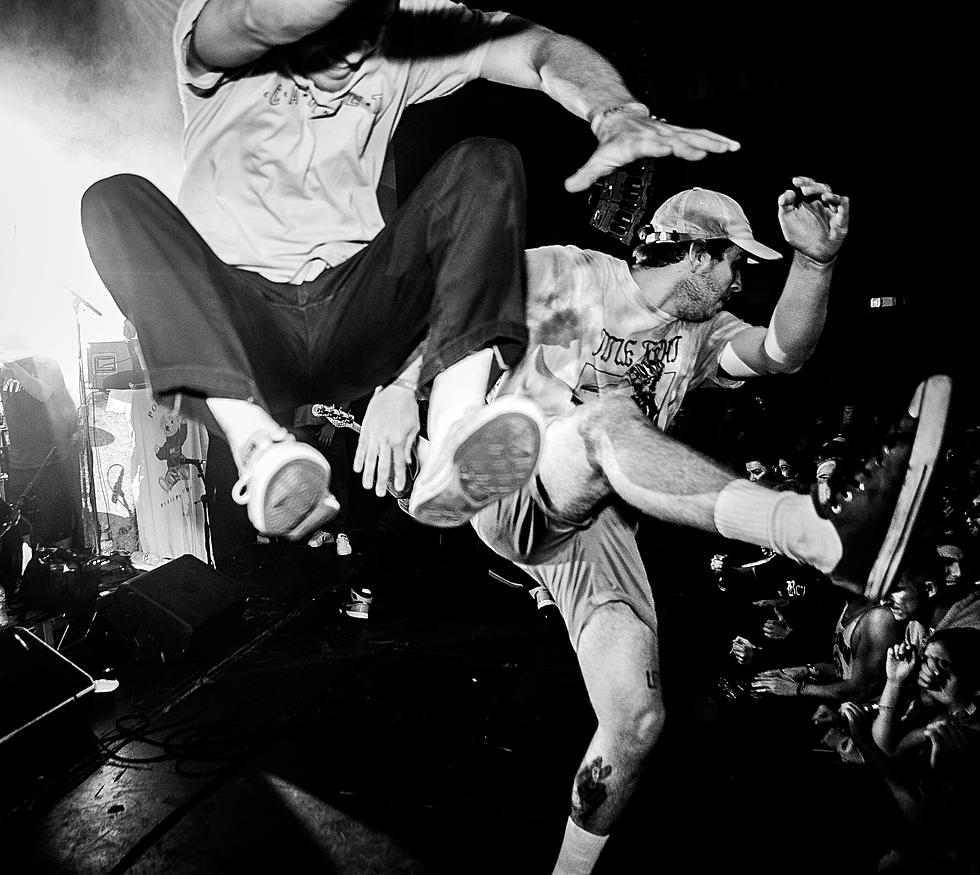
The Photo Book That Spans Pantera’s Entire Career
A Vulgar Display of Pantera is literally just that. The new photo book, out now via Lesser Gods, is a bevy of incredible images that spans the life of the legendary Texas metal band, capturing them from their early days as an above average cover band to the end of their run in 2003. Joe Giron was on board for all of it.
Described by bassist Rex Brown as "the fifth member," Giron documented Pantera throughout their travels around the world, leading up to their dominance as one of the biggest acts in extreme music. The result: one of the most visually stunning and comprehensive documentations of a band put to print, close to 400 pages of images that will excite and awe.
We interviewed Giron and Brown about the book and Pantera's early struggles. The resuls of our conversation are below.
This book is absolutely overwhelming. Pantera were always an over the top band in a lot of ways, even the idea of "Cowboys From Hell," and I think that's conveyed in this book. What are your favorite photos in this book, and your favorite memories that go with it?
Joe Giron: I think one of my favorite images is the group shot of the band with the militia people in Russia. It was such an experience being in Russia. Obviously, we never thought we'd be there playing a show with AC/DC and Metallica, and with the society changing from communism to more of a free system, the people were so excited to be there and see something Western. As I said in the book, even though there weren't really record releases in Russia, there was a lot of black market stuff, and these people knew the band and mobbed [them]. And then having that sort of visual of a militaristic society made it look like an east-meets-west kind of deal, or democracy meets communism ... It's kind of one of my favorite images.
Rex Brown: When Joe approached me about this thing, I knew he had been working on this stuff for a while. We have stayed in touch over the years, even though some of us have kind of [wandered] off. A lot of this stuff was overwhelming to see — a lot of it revolved around ["Dimebag"] Darrell [Abbott, guitarist]. He was the epitome of the heart and soul of the band. There was always something crazy going on, and Joe capturing the interaction between Dime and I. Now I'm going on 12-13 years that he's no longer with us. He was a huge part of me and everything you know about Pantera. Going back through the roller coaster and everything, it was four individuals who were very individual, putting it all together to make it work for as long as we could. It was just so crazy.
Are you familiar with the Myers-Briggs test, where it tells you what kind of person you are? Some people are entrepreneurs, some people are negotiators, etc. What would you say your dynamic was within the four of you? There were some strong personalities in that band.
RB: I would say I was more laid back, and I had to go in between the brothers, who are insane. I was the middleman between some of the insanity. Sometimes I was the instigator. It was always just about playing music, nothing else, and for some it became about the rock star thing, but for the most part, it was about playing music and getting on that stage. All four of us were always about the music part, because all of that party-all-the-time shit gets overwhelming. The goal was all for one, but sometimes you had to pick your side very carefully.
JG: I saw Rex's role — like he had to balance everything out — and he pulled it off. Because of his laid-back personality, he could negotiate and talk to the various sides, and have his own input as well.
What do you think was your "call your mom” moment as a band? The big turning point?
RB: Mine is kind of personal, because my mother had passed away while we were on the road in '93 to finish the Skid Row tour. The day she died, she got a package for a gold record for Cowboys From Hell. That was just insane.
JG: In terms of knowing that they had "made it," that was when they did the videos from Cowboys From Hell with professional video equipment.
RB: At a certain point, we had been passed over by 28 different labels and were just like, "Fuck it, we're gonna go out there and do what we're gonna do." The fact that we even had any success made us stick to our guns. We didn't want to go out there and do something because it was commercially viable — that would be the death of a band. When the four of us walked into a room, it was with a chip on our shoulder; you knew that you were in for some shit when we walked in the door. We could be totally cool, or you rile us up, and that's your mistake. That's just how you gotta play the game ... that was the epitome of the band 'til the very end.
At the time, you, Metallica and Megadeth were crossover bands in the biggest sense, both playing big arenas and appearing on the pop charts. As a band with that sort of stature, did you ever feel the need to fly a flag for metal?
RB: No. For as many days were booked out of the year, it was just survival instinct. Joe was — in everybody's opinion, he was the fifth member of the band. He was as tight or tighter than [a] band manager. We basically managed ourselves — we had management that answered the phone, and I would take it to my agent before I'd even take it back to my management and say yes about it. That's always one of those things that I feel like you don't find that kind of camaraderie very often, where the word of your brother comes before anything else and makes everything else bullshit. Some of the stuff that we had to deal with on a day-to-day basis, you just had to suck it up, But we were some crazy motherfuckers back in the day. And we're still sitting here talking about it.
JG: I think they were just being true to themselves and just being the people they were. [They] carried the flag for metal because of what they produced. There was nothing forged or fake about it. What these four guys did when they went into the recording studio, to me, was just magic, because there was nothing fake about it. It was just true and raw honesty.
You've had legendary success, but looking back, do you have any stories about struggles
RB: When we first started playing, it was almost six nights a week; [it] made the band extremely tight musically. We had to do a lot of covers until about '88, when we were starting to sell clubs for 2,000 people; they would have to actually build onto the bar just to get more people into some of these places. After a bit, we just said, "Screw all of this cover crap — we're just going to do original material." When we started doing that, that's when we really came into our own. We just took it to a different level, and the only way for it to be seen was to not wear that stupid-looking shit that we didn't want to wear. I got into the band when I was 17 years old, and I'll be damned if we weren't booked straight until the very end.
JG: When I met them in '85, they were doing a Tuesday-through-Saturday thing and four sets a night. In '85, one of the sets would be the original stuff off the independent releases before they signed the record deal. Obviously, they had Terrence Lee [Terry Glaze] in the band before Phil [Anselmo, vocalist], but the three musicians in the band just played so much that it was just so tight ... Their chemistry was just amazing — they got at the improvisation they could do on stage and just mess around with various other bands' riffs or whatever in terms of the covers stuff. During a Pantera set, you'd hear a Kansas riff or a Ted Nugent riff in there ...
RB: We sold 40,000 copies of just our independent [album] Power Metal just out of the back seat of our car. We played more in-stores than I think any band has ever done. A lot of people will go, like, " I got a major label deal!" and they just get all this money and just go to shit. That's when you get your foot in the door, when the real hard work starts. Everything up to it is really just the building blocks to where you're seeing where you're gonna go.
JG: I don't know if this is really considered a struggle on their part, but just an observation from one of the original Cowboys From Hell tours: Instead of having an actual tour bus, they had an RV they rented. You could see it in the old videos. That thing just got destroyed by the end of the tour.
One last question for Joe: When you were coming up, who was the photographer that you looked up to?
JG: When I was getting into metal when I was 14, it was Bob Gruen. Then I started seeing a lot of Neil Preston stuff done of Led Zeppelin. Then, on an internship, I worked at a newspaper before I was a rock freelancer, and was up in Tucson in the summer of '82, and I saw an issue of Kerrang! magazine. I picked it up and looked at it, and it was all available-light concert photography — it wasn't Circus or Creem camera-on-flash with washed-out tones; it was really atmospheric photography. It obviously had some great portrait sections and Ross Halfin was one of them, and Robert Ellis was another. Robert became my agent in London, and covered Europe for me in terms of my work and stuff like that.
More From CLRVYNT









